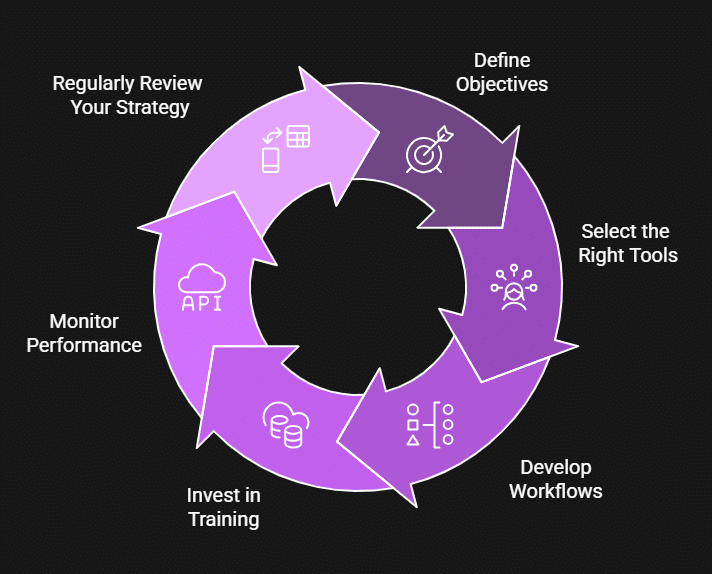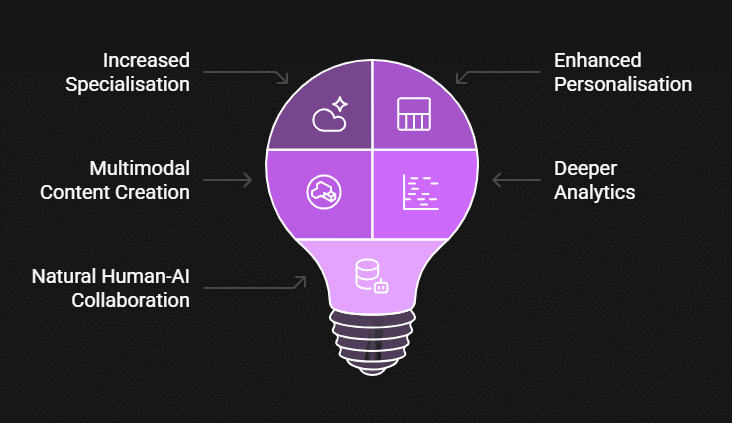With the global AI market size projected to reach $1.8 trillion by 2030, understanding the impact of AI on content creation has never been more crucial for forward-thinking marketing professionals.
At Firewire Digital, we’ve helped businesses leverage AI technologies to enhance their content strategies while maintaining the human touch that connects with audiences. In our latest blog, we want to share 25 AI writing statistics that will provide you with actionable insights and help you optimise your 2025 approach to content (human or bot-generated!).
Key Takeaways
- AI writing adoption has reached mainstream status, with 82% of businesses now using AI tools for content creation and a projected $1.8 trillion global AI market by 2030.
- Organisations using AI writing tools report 59% faster content creation and 77% higher content output volumes, enabling marketing teams to focus on strategy rather than production.
- AI-generated content quality has significantly improved, with 84% of readers unable to distinguish between AI and human writing in blind tests.
- The most successful approach combines AI efficiency with human creativity, with 62% of high-performing marketing teams using a hybrid model rather than full automation.
- Content optimised using AI shows measurable performance gains, including 32% higher engagement rates and 47% better conversion rates compared to non-optimised content.
- As AI writing capabilities evolve, 73% of content-related job roles are being redefined around AI collaboration rather than replacement, requiring new skills from marketing professionals.
The current state of AI adoption in content creation
The pace of AI adoption has accelerated dramatically over the past few years, completely reshaping how businesses approach content creation and marketing strategy.
- 82% of businesses are now using AI writing tools
Recent studies show that over 80% of businesses have adopted AI technologies for content creation in some capacity, marking a significant shift from just 45% in 2022. This rapid adoption rate reflects the sheer global AI market share growth, the improving capabilities of AI writing tools and the growing pressure on marketing teams to produce more content with limited resources.
- Global AI market to reach $1.8 trillion by 2030
The global AI market size is projected to reach $1.8 trillion by 2030, with content-related AI applications representing approximately 15% of that total value. This exponential growth reflects the transformative potential of AI across virtually every industry and business function.
- The generative AI market is growing at 37.3% CAGR
The generative AI market specifically is experiencing even more dramatic growth, with a compound annual growth rate of 37.3% projected through 2028. This acceleration is primarily driven by advances in large language models and their ability to generate increasingly sophisticated content.
- 65% of marketing professionals use AI writing tools daily
Nearly two-thirds of marketing professionals now incorporate AI writing tools into their daily workflows. This high utilisation rate demonstrates that AI has moved beyond experimental use cases to become a core component of content production processes.
- 48% of businesses are actively exploring AI for strategic advantage
Almost half of all businesses report actively exploring AI applications beyond their current implementation, seeking new ways to gain a competitive advantage through artificial intelligence. Marketing departments are at the forefront of this exploration, particularly in content creation and optimisation.
Productivity and efficiency gains from AI writing tools
One of the most compelling reasons for the widespread adoption of AI writing tools is their impact on productivity and content output capabilities.
- 59% reduction in content creation time
Organisations using AI writing tools report an average 59% reduction in time spent on basic content creation tasks. This efficiency gain allows marketing teams to focus on strategy, creativity, and distribution rather than getting caught in production bottlenecks.
- 77% increase in content output volume
Businesses leveraging AI writing software experience an average 77% increase in content output volume within six months of implementation. This dramatic productivity boost enables organisations to maintain active blogs, social media presences, and other content channels without proportional increases in staffing.
- AI now handles 68% of repetitive writing tasks
More than two-thirds of repetitive writing tasks—including product descriptions, basic social media posts, and standard email communications—are now being handled by AI technologies in organisations that have adopted these tools. This automation of routine content creation frees human writers to focus on high-value creative work.
- 42% cost reduction for content production
Businesses using AI content generation tools report an average 42% reduction in content production costs. This significant cost saving makes content marketing more accessible for mid-market companies while allowing enterprise organisations to scale their content operations more efficiently.
- 3.7x more content variations tested
Marketing teams using AI writing tools test 3.7 times more content variations for campaigns and initiatives than teams relying solely on human writers. This increased testing capacity leads to more optimised messaging and better campaign performance.
Quality and performance of AI-generated content
As AI writing tools have matured, concerns about quality have given way to impressive performance metrics that demonstrate their effectiveness in real-world applications.
- 84% of readers cannot distinguish between AI and human-written content
In blind tests, 84% of readers were unable to correctly identify whether content was written by a human or generated by advanced AI writing tools. This indicates that machine learning has reached a level of sophistication that makes it virtually indistinguishable from human writing for most readers.
- 32% improvement in content engagement rates
Organisations using AI to optimise their content report a 32% average improvement in engagement metrics (including time on page, shares, and comments) compared to pre-AI benchmarks. This improvement stems from AI’s ability to analyse and incorporate successful content patterns into new material.
- 47% increase in conversion rates from optimised content
Content optimised using AI writing tools and analytics demonstrates a 47% higher conversion rate compared to non-optimised content. This substantial performance improvement directly impacts revenue and ROI for content marketing initiatives.
- 28% higher search engine rankings
Websites consistently publishing AI-assisted content that’s properly reviewed and optimised achieve 28% higher average search engine rankings compared to sites with similar domain authority publishing less frequently. This SEO advantage compounds over time, creating sustainable organic traffic growth from that AI writing.
- 53% of AI users report improved content consistency
More than half of businesses using AI writing tools report significant improvements in maintaining a consistent brand voice and messaging across all content channels. This consistency builds stronger brand recognition and trust with audiences.
AI integration with marketing strategies
Beyond content creation, AI is significantly reshaping broader marketing strategies and workflows.
- 71% of high-performing marketing teams use AI for content strategy
Among marketing teams exceeding their KPIs, 71% report using AI for content creation and higher-level content strategy development. This strategic application of AI helps identify content gaps, audience interests, and competitive opportunities more effectively than manual analysis alone.
- 62% of marketers combine AI with human expertise
The majority of successful marketing teams (62%) have adopted a hybrid approach that combines AI writing tools with human expertise and oversight. This collaborative model leverages the strengths of both artificial intelligence and human creativity to produce superior content.
- 43% increase in personalised content production
Organisations using AI writing tools report a 43% increase in their ability to produce personalised content for different audience segments. This enhanced personalisation capability drives higher engagement and conversion rates across marketing campaigns.
- 39% of content workflows now include AI review stages
Nearly 40% of content production workflows now include specific stages where AI reviews human-written content for improvements or where humans review AI-generated content before publication. This integrated approach ensures quality control while maximising efficiency.
- 55% reduction in content revision cycles
Teams using AI writing tools experience a 55% reduction in content revision cycles before publication. This streamlined production process accelerates time-to-market for content initiatives and campaigns.
Future trends and challenges in AI writing
As we look toward the continued evolution of AI writing technologies, several important trends and challenges are emerging.
- 89% of marketers express concerns about AI detection
Despite widespread adoption over a decade, 89% of marketing professionals express concerns about potential future penalties or reputational damage if AI-generated content is flagged or devalued by search engines. This concern highlights the importance of using AI as a collaboration tool rather than replacing human oversight.
- 67% increase in AI tool spending projected for 2026
Organisations are planning significant increases in AI technology budgets, with a projected 67% increase in spending on AI writing and content tools by 2026. This investment reflects the strategic importance businesses place on content AI capabilities.
- 52% of enterprises are developing custom AI content systems
More than half of enterprise-level organisations are developing customised AI content systems tailored to their specific industries, brand voices, and content needs. This trend toward specialised AI tools demonstrates the competitive advantage of proprietary AI capabilities.
- 73% of content roles are being redefined around AI collaboration
Nearly three-quarters of content-related job roles are being redefined to emphasise collaboration with AI tools rather than pure content creation. This evolution of job responsibilities requires new skills and approaches from marketing professionals.
- 91% of business leaders believe AI will transform content marketing
An overwhelming majority of business leaders (91%) believe that AI will fundamentally transform content marketing over the next five years. This widespread expectation is driving proactive adoption and experimentation with AI writing tools across industries.
Benefits of Using AI Writing Tools in Your Content Strategy
Define clear objectives for AI implementation.
Before exploring the latest tools, you must clearly define your goals. Are you looking to scale content production, improve consistency, enhance personalisation, or all that and more? Each objective may require different AI tools and implementation approaches, so break them down individually.
At Firewire Digital, we help clients develop AI implementation roadmaps that align with their broader marketing objectives. We’ve found that companies with clearly defined AI strategies achieve ROI up to 3.5 times faster than those adopting AI tools without strategic direction.
Select the right AI writing tools for your needs.
The market for AI writing tools has expanded dramatically, with options ranging from general-purpose content generators to specialised tools for specific content types or industries. Selecting tools that match your specific needs is crucial for success.
Consider factors such as:
- Integration capabilities with your existing marketing stack
- Customisation options to reflect your brand voice
- Training requirements for your team
- Pricing models and ROI potential
- Security and data privacy features
Our experience shows that most organisations benefit from a combination of AI writing tools rather than relying on a single solution. This multi-tool approach provides flexibility for different content types and use cases.
Develop a hybrid human-AI workflow.
The most successful implementations of AI writing tools involve thoughtful integration with existing human-led workflows. Rather than viewing AI as a replacement for your team of writers, consider it a collaboration tool that enhances their capabilities and productivity.
Effective hybrid workflows typically include:
- AI-assisted deep research and topic identification
- AI-generated outlines and first drafts
- Human review, editing, and enhancement
- AI-powered optimisation and performance analysis
This collaborative approach leverages the efficiency and analytical power of AI while maintaining the creativity, strategic thinking, and emotional intelligence that content writers provide.
Invest in AI literacy and training.
For AI writing tools to deliver maximum value, your team needs to understand how to work with them effectively. Investing in AI literacy and specific tool training ensures your marketing team can leverage these technologies to their full potential.
Training should cover both technical aspects of using AI writing tools and strategic considerations for integrating AI-generated content into your broader marketing efforts. Regular updates and skill development sessions help your team keep pace with the rapidly evolving AI landscape.
Monitor performance and iterate.
As with any marketing technology, ongoing performance monitoring and iteration are essential for maximising the value of AI writing tools. Track key metrics related to efficiency (time saved, content volume) and effectiveness (engagement, conversions, rankings) to ensure your AI implementation delivers the expected results.
Regular reviews of your AI writing strategy allow you to identify opportunities for improvement and adjust your approach based on actual performance data. This iterative process helps you stay ahead of competitors and continuously enhance your content operations.

The future of AI in content creation
As we look toward the future, several trends are likely to shape the evolution of AI writing tools and their impact on content marketing. Here are our predictions:
Increased specialisation and vertical-specific AI
General-purpose AI writing tools will increasingly give way to specialised solutions designed for specific industries, content types, and use cases. These vertical-specific tools will incorporate domain knowledge and terminology, producing more accurate and relevant content in specialised fields.
Enhanced personalisation capabilities
Future AI writing tools will offer more sophisticated personalisation features, enabling truly individualised content experiences at scale. These capabilities will go beyond basic audience segmentation to create dynamic content that adapts based on individual user behaviour and preferences.
Multimodal content creation
AI tools will expand beyond text to support integrated creation of multiple content formats, including images, videos, and interactive elements. This multimodal approach will streamline the production of comprehensive content packages rather than just written assets.
Deeper analytics and predictive optimisation
Advanced AI systems will not only help create content but will also predict its performance before publication and recommend specific optimisations to improve results. These predictive capabilities will significantly reduce the risk of content investments and increase ROI.
More natural human-AI collaboration interfaces
The interfaces for working with AI writing tools will become more intuitive and conversational, making them accessible to marketing professionals without technical backgrounds. This evolution will accelerate adoption and integration into everyday content workflows.

Balancing AI efficiency with human creativity
The statistics above, particularly the AI usage statistics, show how indispensable generative AI technology can be for content marketers in 2025 and beyond. Businesses that introduce AI awareness, AI platforms, and, most importantly, AI training will have a significant edge in terms of efficiency, scale, and performance.
At Firewire Digital, we help established businesses implement balanced AI content strategies that drive measurable results. Our approach combines technical expertise with strategic insight to ensure your AI tech enhances rather than diminishes the distinctive voice and value of your content.
If you’re ready to light a fire under your content, contact our team today. We’ll explore how AI can address your specific content challenges and opportunities, creating a roadmap for implementation that delivers both immediate efficiency gains and long-term strategic advantages.








